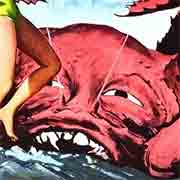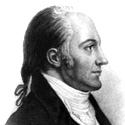|
Just finished reading the Mistborn Trilogy by Brandon Sanderson. Really good read. I loved how it was basically a tragedy arms race until the resolution of the book. I also liked the lack of a truly "evil" character. The Lord Ruler was only trying to keep humanity alive, and Ruin was simply collecting on a deal made with Preservation, which Preservation broke and tried to imprison/kill Ruin. The magic system was also pretty neat, and probably the most unique thing I've seen in books recently. The mixture of allomancy, feruchemy and hemalurgy and how they worked with one another was very interesting. Fake Edit: Xachariah posted:I think the metal Atium refers to Platinum, and it allows you to see a few seconds into the future. surfacelevelspeck fucked around with this message at 18:04 on Oct 5, 2009 |
|
|
|

|
| # ? May 14, 2024 16:33 |
|
Warlock, a western from Oakley Hall, a writer who has the fairly unique honour of being the point where the worlds of the Pulitzer and the Cowboy Hall of Fame converge. The story and characters are familiar enough though: Small town mining town tormented by bandits, sheriff run out of town, town hires badass gunslinger to take a stand. The good news is he makes it into something fiendishly readable and the 500-odd pages seem like half that. Stands up to psychological, allegorical and whatnot readings all you like but the real heart is Hall's control of the narrative; one of the plotlines is always on the verge of bloodshed, non-eventful periods are ruthlessly excised (think Hamsun) and the novel keeps plowing on just as tensely as ever in spite of central conflicts being resolved. Excellent. (Bonus: I was curious whether anyone had turned it into a movie and it turns out there's one where Henry Fonda gets to shoot DeForrest Kelley in the face). Also Sebald's Campo Santo, being some unfinished fragments of a book he was writing about Corsica, as well as a number of his articles slapped on the end to pad it out. Shame he didn't have time to make more of the Corsican material seeing as what's here is vintage Sebald, only with his sights set on a culture a little more distant and raw than his usual. Beyond that, the articles are reasonably interesting, though the most interesting turn out to be the germ of another (finished) book of his, On the Natural History of Destruction, where he condemns the non-reaction of German literature to documenting the experience of their own citizens at the end of WWII. No big surprise here then that a book of fragments and odds and ends is one for the fans only. Last was Machado de Assis' final novel, The Wager which seems to be a play on Les Liaisons Dangereuses; a retired Brazilian diplomat and his sister make a wager that a young widow will marry again. Presented in the form of the diplomat's journal, they both soon admit they're too old for this poo poo and just enjoy their retirement in the company of the widow and her adoptive family instead. For the most part he lets the innovation and satire of his earlier works slide and instead arrives at something like a Stendahl who needs a bit of a lie-down and a cup of tea, constantly remembering what he should have been telling you earlier. In short, pop-fiction readers will probably be bored and it's not hysterical or grandoise enough to be taken seriously as literature by the elitists.
|
|
|
|
Syndlig posted:Just finished reading the Mistborn Trilogy by Brandon Sanderson. Really good read. I loved how it was basically a tragedy arms race until the resolution of the book. I also liked the lack of a truly "evil" character. The Lord Ruler was only trying to keep humanity alive, and Ruin was simply collecting on a deal made with Preservation, which Preservation broke and tried to imprison/kill Ruin. Mistborn Trilogy Ultimate spoilers ahead. Yeah I know it was a physical embodiment of Ruin's power, but the name is close to Platinum, and the description of it seemed to match that of platinum the few times it was described. I thought maybe Ruin's physical manifestation was Platinum or something. Also, cursory question about the plot: As far as I understand, the reason the whole shenanigans kicked off in the first place is because Preservation precipitated a mist made up of its own body (as a result of binding Ruin?). Ruin then made the mists thicker, causing them to block out light and kill crops. Then Ruin seeds the prophecy of the Hero of Ages taking the power and releasing it hereby destroying the mists and saving the world and all that good stuff. In reality Ruin will seize his own essence back and destroy everything or whatever. Nice plan, however, why the hell did Preservation even make the mist in the first place? The mist creates Mistborn and Mistings to fight Ruin, but why would it need to do that if it sacrificed itself to bind Ruin at the Well, to fight the few naturally occurring hemalurgics? I'd probably accept it as being a chess master gambit for the ultimate outcome, but how is Ruin able to thicken the mists while bound? I thought it was limited to changing things not written on metal? As far as I can see, none of the whole thousand years of pain misery, death, mass slaughter, disgusting monsters, ash, mists and generally the whole drat dystopian hellhole would have happened without preservation's mist. Xachariah fucked around with this message at 19:33 on Oct 5, 2009 |
|
|
|
Xachariah posted:Mistborn Trilogy Ultimate spoilers ahead. Preservation created the mists to make mistborn/mistings, yeah. As far as I know this was an attempt to find someone like Vin, who would be a suitable enough host for Preservation's power to be capable of destroying Ruin. In the end, everything, the mists included, was simply Preservation's attempt to kill Ruin to prevent it from destroying the world. As to why Ruin can affect the mists? I don't know, actually. The mists are the physical embodiment of Preservation, so you'd think Ruin wouldn't be able to affect it at ALL because not only was it locked away, but the power that made it stronger than Preservation's nearly mindless body was buried in the Pits of Hathsin and the Homeland. I guess its ability to subtly alter the world (such as increasing the flow of ash over a thousand years, changing texts to alter/create the myth of the Hero of Ages, etc.) might have allowed it to alter the mists to SOME degree over a large period of time? Or maybe it wasn't that at all, since Sazed/God himself said that even with his expanding, omniscient mind he still didn't know everything about what happened yet. Also, though it's on hold atm, Sanderson's making a fourth book in the Mistborn series, though not directly relating to Final Empire/Well of Ascension/Hero of Ages, it's a standalone "short story" about a completely different character and taking place prior to the events of the books. Keeping my fingers crossed he gets around to it soon, I'm salivating for more Mistborn goodness. EDIT: Also, good point with the atium. I guess it could make sense that's what it is, sort of, though that doesn't explain why it leaks out into geodes within the crystal formations of the Pits. That's the only thing that makes me think it's a purely fictional metal and not platinum, really, since it's described to be remakably similar. surfacelevelspeck fucked around with this message at 21:45 on Oct 5, 2009 |
|
|
|
For Whom The Bell Tolls - First time reading Hemingway. The odd dialogue phrasing threw me for a loop at first before I realized Hemingway was "translating" what was being said from Spanish to English. Other than that, I really dug it. Hemingway's sparse prose lends itself well to the story and the insightful commentary on war reminded me a bit of All Quiet on the Western Front (which I read some months ago). Definitely want to read more Hemingway eventually.
|
|
|
|
Dudikoff posted:Neverwhere was much more fun in my opinion. Enjoy. Just finished Neverwhere. A far more enjoyable read. I imagine its because he's English but the depth of the mythos is just so much greater than American Gods. That's me out of Neil Gaiman books unless I read the children's ones.
|
|
|
|
My summer project was to read Foucault's History of Madness. There's a lot of controversy surrounding his cherry picking and bending of historical facts, but I really enjoyed this one. I got it because I finished Discipline and Punishment earlier this year, and found it fascinating. When I received HOM from Amazon I was a bit shocked at how large it was, so I'm pleased with myself having finished it. Keeping in mind all the controversy, I really enjoyed it. I didn't have any specific interest regarding psychology or the history of the insane, but his writing made it impossible not to become interested. In the end, the history part becomes his argument about why we need madness now, before our efforts to snuff it out finally become reality.
|
|
|
|
Rapulum_Dei posted:Just finished Neverwhere. A far more enjoyable read. I imagine its because he's English but the depth of the mythos is just so much greater than American Gods. That's me out of Neil Gaiman books unless I read the children's ones. I heard his children's books are actually really good. I'm picking them up whenever they're back in stock. I normally don't read stuff aimed at younger people but a few authors (Gaiman, Pratchett, whoever wrote Gold Compass) made me reconsider.
|
|
|
|
BubbleGoose posted:Just finished reading One Hundred Years Of Solitude which left me in tears at the end. It's such a stunning and jolting read. I almost feel ashamed that it took me this long to read it. To contribute, I just read Second Skin by John Hawkes. Too many words for a short book. Too much prose style. There are some nice images and islands of sense, but not enough to connect it together: a few finely rendered passages aren't really enough to carry an entire novel. It's dense, confusing, and slow to read. Perhaps this is one of those books that you need to reread once you get the trick of it, if you find the trick clever enough to be worth it. I can't say I hated it, though. Maybe another day I'll try it again.
|
|
|
|
Arc Light by Eric L. Harry. It's your standard Cold War goes hot. Only it's some crazy Russian general that launches the nukes, and the Russians try but fail to prevent the US from nuking them in retaliation and invading the country. I've never read any Tom Clancy books, so this was my first foray into the genre. It wasn't a bad book, but it wasn't that good either. A fun "military porn" sort of book. The Road by Cormac McCarthy. My first McCarthy book, the bleakness in the character's situation was apparent on every page. I found myself wishing they'd just die already and get it over with while at the same time rooting for them. I kept thinking that the boy would end up being a figment of the man's imagination, or that the man wasn't real. Greatly enjoyable book, with a cool ending. No Country for Old Men. My second McCarthy book. I can't say I enjoyed this one as much as The Road. It seemed to be a standard crime drama, with a bit about how the US is going downhill and we have to return to the good old times. I know that Sugar (or however the gently caress you spell it, I was saying Chur-ga for half the book) was supposed to be a psychopath, but his whole modus operandi being about fate seemed a little hackneyed. I tossed the movie on the Netflix queue, I hope it's better than the book. How To Talk About Books You Haven't Read by Pierre Bayard. The title says it all, how *do* you go about discussing books you haven't read? When you say you're "read" a book, what does that mean? It's basically an extended discussion about what reading "is" and what books really "are". It was a good read, but I feel like I could have stopped about halfway through and left with the same message; I ended up skimming the last few chapters anyway.
|
|
|
|
appropriatemetaphor posted:How To Talk About Books You Haven't Read by Pierre Bayard. The title says it all, how *do* you go about discussing books you haven't read? When you say you're "read" a book, what does that mean? It's basically an extended discussion about what reading "is" and what books really "are". It was a good read, but I feel like I could have stopped about halfway through and left with the same message; I ended up skimming the last few chapters anyway.  so basically, you're absorbing the lesson already by the time you're halfway through? so basically, you're absorbing the lesson already by the time you're halfway through?
|
|
|
|
Heart of Darkness by Joseph Conrad. Read it for free, html'd, at http://ebooks.adelaide.edu.au/c/conrad/joseph/ I'm afraid I've been tainted by Coppola's Apocalypse Now and will never be able to see the original novella clearly. It's like in Barth's Lost in the Funhouse where, no matter how you duck and turn, the repeating images in the funhouse mirrors are blocked by the reflections of your own head. I can't see past the power of the movie. The novella presents a dark, knotty, fearful evocation, but I add stuff in that I expect to be there. This is no way to read classic fiction, but what can I do?
|
|
|
|
I remember spending most of The Name Of The Rose trying to fight off Sean Connery in my mind so I know what you're talking about. I just reread Heart Of Darkness too but I didn't have any problems separating it from Apocalypse Now. It's obviously better than on my first read when I was a teenager, but I'm still not that amazed. It's enjoyable up until the point where they reach Kurtz, from then on it becomes very incoherent and most of all disappointing. Kurtz is made up to be an amazing person for the whole trip upstream and then he's just a ill and crazy man. Maybe that's the point but then again people keep raving about him till the end and the reader doesn't get to join in on the admiration because he doesn't do or say anything that warrants it. On a more positive side, I loved how the "visuals" in the book kept getting darker and darker until the end which is practically pitch black. Second book, Mask And Mirror, another collection of short stories by Jorge Luis Borges. The stories are more diverse than in his other books, far less of his usual mysterious tales, to my amazement there wasn't a single labyrinth in the book. There's a H.P Lovecraft parody story which is actually pretty funny since it emulates his style nearly perfectly but in the end is much better written and more scary than the original. Good book if you like Borges and people getting stabbed in South America.
|
|
|
|
After a recommendation from this thread, I think, I just finished The Gone-Away World by Nick Harkaway. I was seriously impressed that this was his first novel and it was probably the most entertaining book I've ever read. It's hard to talk about the book without it sounding weird and off-putting (a troop of mimes, ancient Chinese gong-fu secrets, and a sect of ninja assassins), but it all came out surprisingly well in the story.
|
|
|
|
Oldbill posted:I guess I got what I deserved for reading Palahniuk yet again, but Pygmy was a special blend of insipid that I've never seen before and hope never to see again. I'm a huge Palahniuk fan, but I just finished Pygmy myself, and unfortunately, I have to agree with this post, albeit not as passionately. Really, after nine books of great writing, he tries his hand at writing entirely in Engrish for some reason, and all it did was distract me. A Clockwork Orange is one of my favorite books of all time, but the language in that book was actually essential to the theme, and was fun to decipher as I went on; the Engrish in Pygmy just felt like a failed experiment to me. As for the plot itself, it reminds me a lot of Choke--the plot completely stagnated throughout the majority of the book. And then, out of nowhere, the book ends in two completely nonsensical chapters (Pig Dog Brother joins the fight like something out of an extremely cheesy kids' fighting movie, and suddenly he's just as good of a fighter as the rest of them, and him and Magda--who, by the way, was his girlfriend the whole time!--heroically take down the master ninja fighter in one fell swoop. Seriously, Pahlaniuk, you can do better than this. What the gently caress is up?). In all of his nine previous books, he has never finished with a happy ending. And now I know why -- he loving sucks at it.
|
|
|
|
I just finished Wicked: The Life and Times of the Wicked Witch of the West by Gregory Maguire. The detail is incredible, I'll give it that - the author must have spent ages crafting the social-political system he describes for Oz. It certainly shows Oz in a way that L. Frank Baum's books never could, showing the reader how, exactly, the denizens of a fantastic-magical realm go about their lives. I found it a bit too detailed, though. At times, I felt like I was reading "A Dissertation on the Politics of Oz" rather than following a cohesive narrative. The story gets so bogged down in details, I often found myself wanting to get to the next plot point and skip the exposition. I usually love reading the little details about a fantasy realm, but in this book the exposition just seemed to drag on. I also couldn't feel at all sympathetic for the Wicked Witch. It's especially bad once the Witch has killed an old, near-death former headmaster out of revenge, and then starts gloating about it. Yes, I know that headmaster did horrible things, but a character with whom I'm supposed to sympathize shouldn't be murdering old women and then boasting about it. None of the characters struck me as all that likable or worth sympathy, except for Dorothy Gale! Anyway, Amazon reviews put my dislike of this book in the minority, so clearly many readers enjoyed the great detail given in setting the stage for the story. I found it too bogged down and boring, and I thought it fell far short of the major goal the author set out to accomplish.
|
|
|
|
Dan Simmons's Drood - A fictionalized account of the last 5 years of Charles Dickens's life, as seen from the perspective of his friend and fellow writer Wilkie Collins. As the title suggests, the story focuses on Dickens' obsession with a mysterious figure known only as "Drood". All in all, I liked it - the story was very detailed history-wise, engaging enough to keep me reading despite the slow pacing and the use of the laudanum-addicted Collins as an unreliable narrator is well-done. Unfortunately, I felt like the book does suffer a bit from the same issue of being overly long that The Terror did.
|
|
|
|
I finally finished Twenty Years After, the sequel to The Three Musketeers by Dumas. I wasn't able to get through it sooner, due to it being too nice a book to bring on my ship and constantly going out to sea. I thoroughly enjoyed the book, as the plot pulls a reader along which is typical for Dumas' work. My one gripe is the conclusion. Once the heroes return from England, the story seems in a hurry to collapse on its self, and while the finale is sufficient, the last few chapters consist of little more than listing the resolution for each of the minor players (and there are substantially more in this book) after the riots and almost civil war in Paris. The book is darker than the first, largely due to the political climate, both in Paris and in England. In fact, England is the setting for most of the second half of the book. The characters are very much the same as in the first, if not more distilled into archetypes, especially Porthos. He is portrayed as a mountainous man with strength to match. Athos is still wise and fatherly (doubly so, as he has taken in a youth to raise as his own.) D'Artagnan is still the binding force and the clever one who uses everyone to their greatest potential. I think only Aramis is inscrutable. It almost seems that Dumas didn't know what to do with him as he is almost an afterthought in much of the book. I don't know that I can say I liked the original or its sequel better. While the brighter story and setting (and completely infallible main characters) better suit the tone and pacing of Dumas, the subdued tone, more serious setting and unexpected (minor-ish) failiure of the musketeers in the second book comes as a shock considering what had come before and does very well at supplanting expectations, which is also appreciated. Edited for a nasty run-on, though I'm sure I've left more errors up there. the amber trap fucked around with this message at 02:27 on Oct 10, 2009 |
|
|
|
Finally made it through Infinite Jest by David Foster Wallace. Definitely one of the best books I've read this year, though it took me nearly a month to finish. The ambiguous ending was amazing and completely expected for a work like this. Do the ETA players get gunned down by the AFR during their exhibition game? Why does Hal only make animal noises in the beginning? Did he accidentally see The Entertainment? Was he drugged by Pemulis? Is Joelle really disfigured, or is she hiding her face because it actually is too beautiful? So many unanswered questions, which is what I love the most about this book. I also loved the idea of The Entertainment (and I'm glad we actually do get a description of what it contains eventually, I was worried he'd leave this a mystery to the reader), and it was fun trying to puzzle out the wider social-political setting the book takes place in. The hyper-descriptions of everything were also fun, and the endnotes describing Himself's films were amazing. I'm honestly surprised no ones ever tried to recreate his version of Infinite Jest V (VI?) for fun considering DFW's fanbase. Next up is Confucius' Analects. It's time to journey to the East for a while.
|
|
|
|
Encryptic posted:Dan Simmons's Drood - A fictionalized account of the last 5 years of Charles Dickens's life, as seen from the perspective of his friend and fellow writer Wilkie Collins. As the title suggests, the story focuses on Dickens' obsession with a mysterious figure known only as "Drood". All in all, I liked it - the story was very detailed history-wise, engaging enough to keep me reading despite the slow pacing and the use of the laudanum-addicted Collins as an unreliable narrator is well-done. Unfortunately, I felt like the book does suffer a bit from the same issue of being overly long that The Terror did. Ha, I just finished the same book not 10 minutes ago. While I enjoyed the book it does, as you said, seem a bit overly long. There's also the fact that the story just kind of falls apart at the end but it seems that's what Simmons was going for with Collins failing health and mind.
|
|
|
|
the amber trap posted:I finally finished Twenty Years After, the sequel to The Three Musketeers by Dumas. I wasn't able to get through it sooner, due to it being too nice a book to bring on my ship and constantly going out to sea. You seriously ought to get the second sequel. I've already mentioned in this thread before, but hey, there is no such thing as "getting too much Dumas". Try to get a copy of this: http://en.wikipedia.org/wiki/The_Vicomte_of_Bragelonne:_Ten_Years_Later I just finished reading Kurt Vonnegut's Galápagos. Took me a while to get into it, but when I got into the rythm of the book, I found it both hilarious and bleak, often at the same time. I don't know how the hell that works. I don't think I got all I could get out of the book, so I will probably revisit it in the future, but it was certainly something different than what I expected. I have not decided what I will read next, if I will re-read Eco's The Name of the Rose again, or if I am going to try one of the Cormac McCarthy I acquired a couple of months ago.
|
|
|
|
muscles like this? posted:Ha, I just finished the same book not 10 minutes ago. While I enjoyed the book it does, as you said, seem a bit overly long. There's also the fact that the story just kind of falls apart at the end but it seems that's what Simmons was going for with Collins failing health and mind. So a standard Simmons book then?
|
|
|
|
Luisfe posted:You seriously ought to get the second sequel. I've already mentioned in this thread before, but hey, there is no such thing as "getting too much Dumas". Ten Years Later can be a pain in the rear end to find because it's usually broken up into volumes. For reference, if you go for ebooks, this is the correct order of Project Gutenberg files: Vicomte de Bragelonne = #2609 Ten Years Later = #2681 Louise de la Valliere = #2710 The Man in the Iron Mask = #2759 Those four files, I think, cover all of the third book. There are some false leads out there, even on Gutenberg, that are just bits and pieces rather than the full story.
|
|
|
|
Tiny Acts of Rebellion- 97 almost-legal ways to stick it to the man by Rich Fulcher I liked this book, but I'm really glad it's my brother's copy not mine, because I wouldn't pay £10 for it (it was a pretty slim volume). It was pretty funny and had some interesting ideas for how to be a little arsehole- I think my favourite was peeing in a ziplok baggie on a Ryanair flight and leaving it in your seat as you leave. The little illustrations are great, as is the dedicated vomit page for those readers so disgusted by the concept of this book that they wish to empty their stomachs on it. A silly book for silly people, but excellent if you need something to cheer you up in bite-sized chunks.
|
|
|
|
Luisfe posted:You seriously ought to get the second sequel. I've already mentioned in this thread before, but hey, there is no such thing as "getting too much Dumas". Aaron Burr posted:Ten Years Later can be a pain in the rear end to find because it's usually broken up into volumes. For reference, if you go for ebooks, this is the correct order of Project Gutenberg files: This makes me excited. I read the wikipedia summary, and I'm desperate to find it now. I've just given away my copy of The Count of Monte Cristo again (I didn't even have a chance to read this one) so now I have to add another Dumas to that one. Unfortunately, I'm out to sea and won't be able to begin my search effectively until I return from the Caribbean.
|
|
|
|
Slaughterhouse Five by Kurt Vonnegut. Very interesting and well-written book, I've definitely never read anything like it before. It's essentially an entire story told all at once - rather than from beginning to end, everything happens simultaneously. Vonnegut's an incredibly talented writer to pull something like that off and still keep it incredibly readable and entertaining - at no point did it feel like I was forcing myself through the book, or that I was confusedly trying to piece anything together. Plus, the story itself was fantastic even without the non-linear thing. Great novel.
|
|
|
|
The Seance by John Harwood. It's billed as a victorian ghost story, and I read it expecting ghosts (I haven't read a good ghost story in ages) so I was a bit disappointed on that front since there are none. It is however very well written and fans of victorian mysteries would love this one. There is a bit of a paranormal aspect to it, so that was fun. Like a lot of victorian mysteries it employs the old story within a story plot device where you read what happened in the past from old letters or diaries and the present character digs out clues to find out what is happening now. Not really my style of novel, but the dude sure can write. It's always strange though to read victorian novels because the female characters are always depicted as weak and fragile, fainting left right and center, tremble in fear at the smallest shadow, have to be chaperoned in the presence of men, all that stuff. Goes with the genre though. The female characters in this one at least are pretty intelligent and curious. Next up is Iron Council by Mieville, so excited! I'm also reading Monster Island by Wellington, a zombie book, it's decent and fun, we'll see where it goes. I gave up on City of Golden Shadow by Tad Williams, I just can't get into it. The writing is bland, the characters are not interesting, it's just incredibly boring. The concept is great and it seems like I should love it, but I really don't. Blech. I finished The Road but enough people have covered that one already.
|
|
|
|
If you're going to read the other Wellington zombie books just an FYI that the second book is actually a prequel but the third book picks up the different plot threads from the first two. Also if you liked that book you might want to check out his vampire series (13 Bullets, 99 Coffins and Vampire Zero) which has a rather unique take on them. Just if you read them and are picking up the newest editions don't read the back of the second and third books first as they spoil the other ones.
|
|
|
|
13 bullets is actually one I was going to pick up soon, I didn't even realize it was written by the same author
|
|
|
|
His vampires are basically the anti-Twilight/Interview style vampires. They're disgusting, ugly and while they might have long life spans it comes with the drawback of needing vast amounts of blood every day to function. He plays a cool bit in that series in that people are aware of vampires, they just think they're extinct.
|
|
|
|
Just finished Pygmy. I found the language kind of had at first. I was about to give up but hold on a bit longer. Then it turned and I started to like it. I liked it as a whole. It's a great book. Read it. Do it... now
|
|
|
|
I just finished Arthur C. Clarke's Odysseys, meaning 2001, 2010, 2061 and 3001. I hadn't done any reading for a long time and this made me want to read again. Clarke definitely put the "science" back in "science fiction". Notably, the way he describes Bowman's "evolution" into an all-powerful being is an amazing read. Also the description of Europa and Jupiter which are simply stunning. Is there a topic on these books? I'd love to see some discussion on them
|
|
|
|
Luisfe posted:I just finished reading Kurt Vonnegut's Galápagos. Took me a while to get into it, but when I got into the rythm of the book, I found it both hilarious and bleak, often at the same time. I don't know how the hell that works. I don't think I got all I could get out of the book, so I will probably revisit it in the future, but it was certainly something different than what I expected. Given your reactions to Galapagos, I'd suggest you take a look at Heller's Catch 22 which is well worth reading and which had much the same impact on me.
|
|
|
|
appropriatemetaphor posted:The Road by Cormac McCarthy. My first McCarthy book, the bleakness in the character's situation was apparent on every page. I found myself wishing they'd just die already and get it over with while at the same time rooting for them. I kept thinking that the boy would end up being a figment of the man's imagination, or that the man wasn't real. Greatly enjoyable book, with a cool ending. I just finished this one, as well. And it was my first McCarthy book. (I didn't realize he wrote No Country... until I read more about him). Was a really excellent book. But you are spot on about the bleakness, it is with you every moment that you are reading this book. It's not only apparent in the language and the situation of the characters but, I feel, you can also feel it in the very style in which the book is written. Really great, but so depressing. I also just finished Driving over Lemons: An Optimist in Andalucía by Chris Stewart. I found it to be very funny and light. It is written in travel literature style, and really paints a lovely and interesting picture of the people and land of the Alpujarrás in Spain, especially from the viewpoint of a total outsider. I enjoyed it.
|
|
|
|
Falling Man by Don DeLillo. A novel of 9/11 following the POVs of a survivor, his estranged wife, and a terrorist. DeLillo has a talent for making his characters seem like beings from another planet, which I consider not a problem but a feature. There's always something fresh and idiosyncratic about them that underlines how different we are inside our skulls, which I think is the first wise thing a person learns about other human beings. Whether this follows from a great insight into people or is merely a stylistic tic based on carefully groomed random processing hardly matters. It works for me. DeLillo has a clean, clever prose style as well. I have Underworld in the wings, but though I seem to be avoiding fat books at the moment, I'm looking forward to it.
|
|
|
|
Sue Grafton's N is for Noose, one in a series about a female private detective. Not a complicated book, I knew who the bad guy was pretty early on but not exactly why. And the ending was a bit trite, but I didn't look to see if it was the abridged (audio) version or not. I also just finished Stephen King's Gingerbread Girl, which was surprisingly (and delightfully) short. It reminded me that he really is a good writer, but sometimes gets bogged down in adding just one more period - for 300 pages. He can build a great story with a lot of action and an OK ending in a decent time period, and not have it suck, a la Colorado Kid. Also recently cast aside A Confederacy of Dunces because I hated every character and it was a colossal waste of time when I could be listening to something enjoyable. And finally, P.G. Wodehouse's Carry On Jeeves, which is the first/one of the first in the Jeeves and Wooster series. It. Was. Awesome. Being written so long ago (1925), the customs and language were nearly foreign, like 'dressing for dinner.' I highly suggest these as audiobooks because they're read by a fabulous narrator and the accent helps pull you into the time and place.
|
|
|
|
On a cross-country flight to and from Boston I ended up chewing through the Night Angel Trilogy by Weeks. It's your standard popcorn-munching fantasy fare, but it's reasonably well-crafted, with engaging characters, suitably tuned challenges for the characters which aren't massively implausible, and reasonable levels of power creep on both sides as the trilogy goes on. The magic system is relatively prosaic compared to something like Mistborn, but it's still got a fair number of interesting and unexpected ways of using it and is mostly self-consistent (lead shoes, really?). Worth a read if you enjoy that kind of thing.
|
|
|
|
That70sHeidi posted:I also just finished Stephen King's Gingerbread Girl, which was surprisingly (and delightfully) short. It reminded me that he really is a good writer, but sometimes gets bogged down in adding just one more period - for 300 pages. He can build a great story with a lot of action and an OK ending in a decent time period, and not have it suck, a la Colorado Kid. I just finished Stephen King's Duma Key and all I can think of is how much of it was surplus. I dug through that book like it was made of super hard toffee just to see if there was going to be a story and by the time things actually started happening I'd stopped caring about any of the characters. It's a shame because the last 250 pages were pretty good, and I realised that the story had to take time to work and the author wanted to work through his own accident on paper but still... so long and with so little reward. I felt almost cheated by the end. Every character seemed to have a magic power too, and everyone was so rich in it. The main character was rich. The old lady was rich. Rich rich rich. I think I've found out I don't like stories with rich people in them. However, as this was my first encounter with King, I'm willing to give him a second chance. I'd like to read The Shining.
|
|
|
|
I re-read Red Mars, the last time I can remember reading it was middle or high school. I thought it was going to be all As far as the science/terraforming stuff it's still quite interesting although it's obviously getting a little dated, setting-wise especially.
|
|
|
|

|
| # ? May 14, 2024 16:33 |
|
I just finished Snuff by Chuck Palahniuk. I dunno, it was pretty bad. I read it cause i needed to take a break from Gunter Grass' The tin drum 'cause it's a pretty dense / boring book. Oh well back to a gay retard baby banging on his drum for another hundred pages I guess (literally what the tin drum is about) Mata fucked around with this message at 23:06 on Oct 14, 2009 |
|
|
































